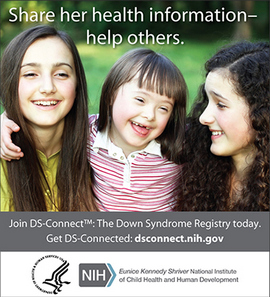New Down syndrome registry has 1,422 users—and growing

During Trisomy Awareness Month in March, the NICHD joins other organizations to raise awareness about trisomy conditions and the challenges they can pose to individuals and families.
"Trisomy" occurs when a person has an extra chromosome in most or all of his or her cells—47 chromosomes instead of the usual 46. An extra chromosome can cause health problems ranging from mild intellectual and developmental disabilities (IDDs) to severe physical and cognitive problems.
The best known trisomy condition is Down syndrome, or Trisomy 21, which occurs when an individual has an extra copy of chromosome 21. Down syndrome occurs in about 1 in 700 live births in the United States each year, according to the Centers for Disease Control and Prevention. People with Down syndrome often have mild-to-moderate IDDs, heart abnormalities, higher risks of hearing and vision loss, and a number of other health conditions.
The NIH has made significant progress in advancing Down syndrome research. In September 2013, the NIH launched DS-Connect®: The Down Syndrome Registry as a powerful resource to facilitate information sharing among people with Down syndrome and their family members, researchers, and parent and support groups.
Individuals with Down syndrome—or family members who volunteer on their behalf—can create a profile and then complete the Registry's confidential health-related survey online. Depending on their answers to specific questions, users may be asked to provide more details on specific conditions, such as congenital heart defects.
Registered users can see combined information from all of the completed surveys (without any identifying characteristics of the participants, so the information remains confidential). This is called "de-identified aggregate data," and it provides overview information about all of the Registry participants with Down syndrome.
The Registry is also preparing to launch its "Professional Portal" in the next few months. This resource will provide registered researchers, clinicians, and other health care providers with de-identified data and information to help them design clinical studies to learn more about Down syndrome.
DS-Connect® will also help support recruitment for clinical studies on Down syndrome. Researchers can alert the Registry coordinator about upcoming studies, and the coordinator will pass that information along to families who may be eligible, allowing them to choose whether they want to contact the researcher about participating. There are also future plans to link DS-Connect® to a biobank that will store donated samples, such as cells and tissues.
These efforts will advance research by making information available to more researchers and by giving families a chance to participate in research on Down syndrome.
In addition to DS-Connect®, the NICHD is involved in a variety of activities related to Down syndrome and other trisomy conditions. Some of these are listed below:
- The Down Syndrome Consortium, led by the NICHD, brings together stakeholders from public and private groups and other NIH Institutes to promote the exchange of information on Down syndrome research. The Consortium members have been involved in revising the NIH Research Plan on Down Syndrome and are involved in outreach efforts to encourage families to sign up for DS-Connect®.
- The NICHD leads the NIH Down Syndrome Working Group, which was created to coordinate and advance NIH research on Down syndrome. The Working Group includes representatives from five other Institutes: the National Cancer Institute (NCI), the National Heart, Lung and Blood Institute (NHLBI), the National Institute on Aging (NIA), the National Institute of Mental Health (NIMH), and the National Institute of Neurological Disorders and Stroke (NINDS).
- The NICHD's Intellectual and Developmental Disabilities Branch supports activities and research related to Down syndrome and other IDDs through the Eunice Kennedy Shriver Intellectual and Developmental Disabilities Research Centers and other programs. Center researchers are working to better understand causes, find new treatments, and improve lifelong care for those with Down syndrome and other IDDs.
- The Developmental Biology and Structural Variation Branch supports research related to Down syndrome by examining areas relevant to normal and abnormal development, such as the processes, patterns, and genetics of organ and central nervous system development.
- The Neonatal Research Network, supported by NICHD's Pregnancy and Perinatology Branch, is using its extensive database to examine delivery room interventions and health outcomes for early-preterm infants born with Trisomy 13 (Patau syndrome), Trisomy 18 (Edwards syndrome), or Down syndrome.
- The NICHD conducts research related to Klinefelter Syndrome, a trisomy condition that occurs in males born with an extra X chromosome (XXY). Infertility is a key symptom in Klinefelter Syndrome. Among other research projects, NICHD researchers are working to understand how sperm production fails, starting from early in development.
Through DS-Connect® and other NICHD activities, the Institute is working to better understand trisomy conditions and help individuals live longer, healthier lives.
More Information
For more information about the Down syndrome registry and NICHD research, select a link below:
- NIH Resources
- NICHD Resources
- Developmental Biology and Structural Variation Branch
- Intellectual and Developmental Disabilities Branch
- Pregnancy and Perinatology Branch
- Related A to Z Topics
- Previous NICHD Spotlight Related to Down Syndrome
- NICHD News Releases Related to Down Syndrome
Originally Posted: March 6, 2014

 BACK TO TOP
BACK TO TOP